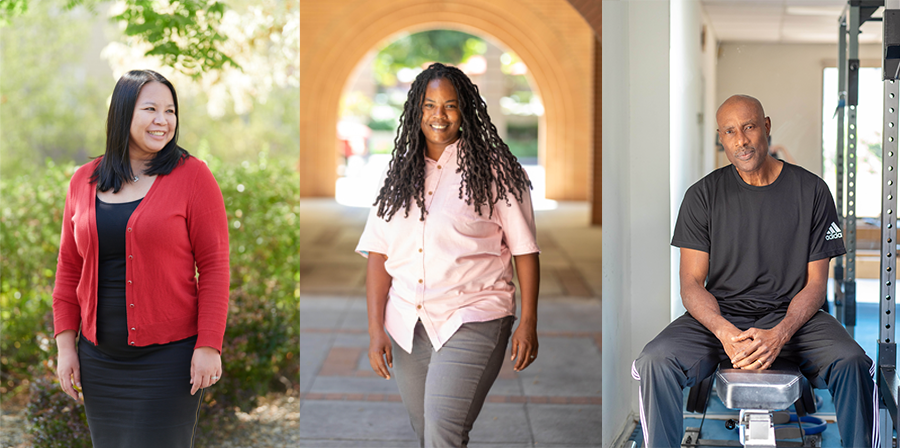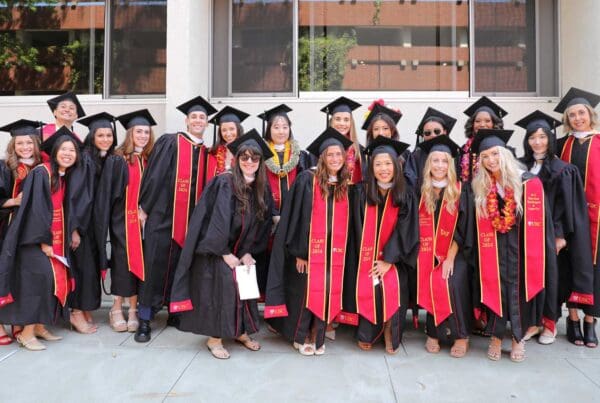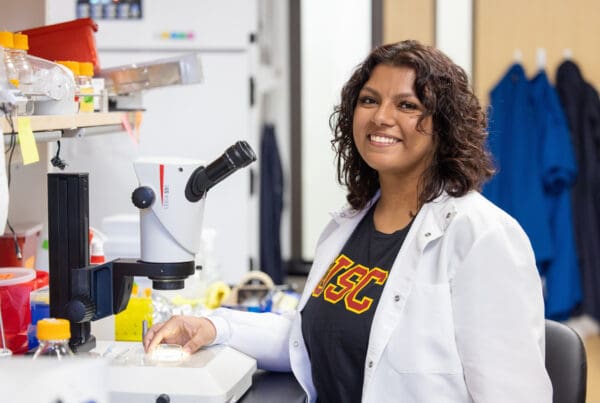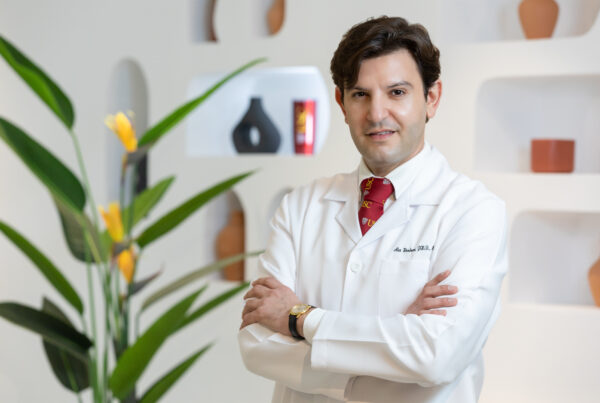Hospitality & Home Comforts
Mariele Soriano, MASLH
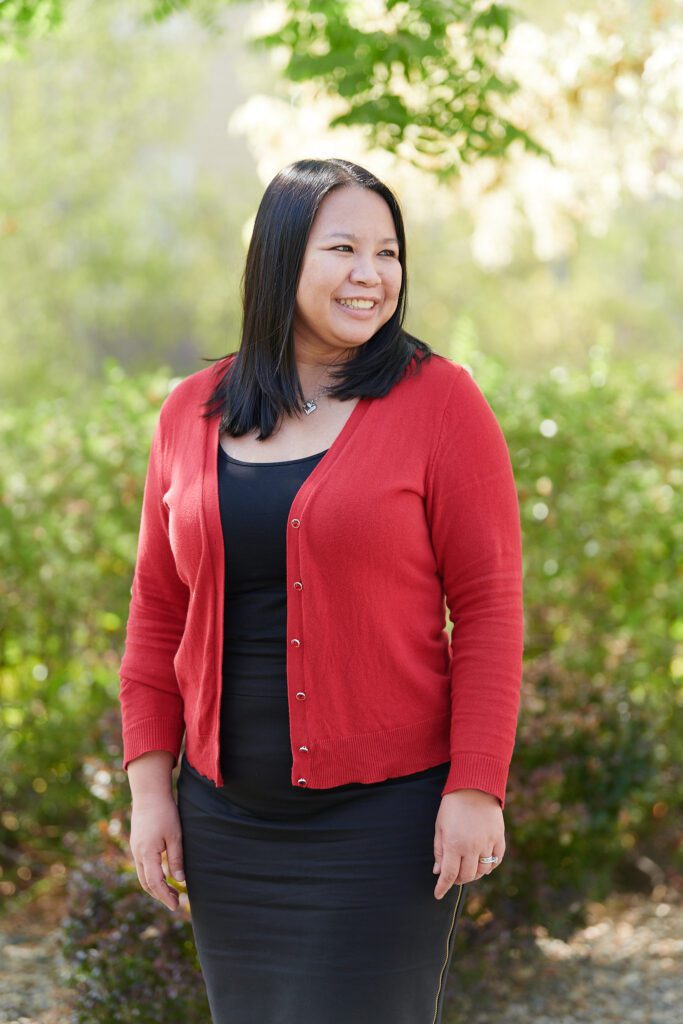
Mariele Soriano (photo by Aaron Wojack)
When Mariele Soriano was a teenager, she moved from the Philippines to Hawaii. To ease the transition, she volunteered at the long-term care facility where her mom worked as a nurse. “Being around the seniors reminded me of my grandparents, who were still in the Philippines,” she says. “I was missing them, so it helped me as well.”
That volunteer work would turn out to be the start of a lifelong career in senior care. Soriano would rise from volunteer to dietary server to nursing home administrator. In 2019, she became executive director of a care community in Santa Rosa, CA.
With the baby boom generation in or nearing retirement age, the senior living industry is growing rapidly. By 2025, the industry will need 1.2 million new employees to support this growing segment of the U.S. population.
At the same time, baby boomers aren’t content with the status quo in their senior living environments. “It’s not just about taking care of the residents anymore. It’s about providing an environment filled with the amenities they expect,” Soriano says.
Leaders like Soriano know that hospitality is the future of senior living. Wanting to be at the forefront, she enrolled in the renowned USC Leonard Davis School of Gerontology.
Training leaders in senior living hospitality
Soriano is working toward a master of arts in Senior Living Hospitality. The program combines an understanding of aging and the needs of older adults with special training in senior living management and hospitality.
For Soriano, the program is enhancing her knowledge and positioning her to be a more effective leader. She points to a marketing course taught by lecturers Jim Biggs and Joshua Johnson MA ’09, both experts in senior living: “I learned about enhancing websites using keywords for search engine optimization (SEO). This is important so people can find us when they search on Google.”
In addition to marketing and branding, leaders in senior care need to be fluent in many other areas. The MA in Senior Living Hospitality program is comprehensive, covering legal and regulatory issues, health care and nutrition, and revenue management and finance. Despite her years of experience, Soriano says she learns something new every day.
A master’s degree plus a certificate in hospitality
This one-of-a kind program allows students to also earn a certificate in hospitality from Cornell University’s Nolan School of Hotel Administration. Through Cornell’s executive education unit, eCornell, Soriano takes two-week classes in hotel and restaurant management.
She sees many parallels between her care community and a hotel: “Our front desk [staff] is like a concierge. They help residents get whatever they need. We also have a driver to take residents where they need to go, just like a hotel.”
Based on a recent eCornell class called “Optimizing Restaurant Space and Pricing,” Soriano is reevaluating her dining room, looking at ways to optimize the seating arrangements and offer options to save money.
Saving money isn’t the only thing on Soriano’s mind; her top priority is the residents. Since becoming executive director, Soriano has implemented an open dining room so residents can eat breakfast whenever they wake up. “We used to tell them they had to get up early so they could eat breakfast,” Soriano says. “Now they can have breakfast at 10 a.m. if they want. It’s all about providing person- centered care.”
The future of senior living
Looking ahead, Soriano is focused on meeting the needs of baby boomers. Her facility will soon include a bistro and a wellness center. She also has ideas for technology upgrades.
While one of the biggest challenges Soriano will face is implementing all the changes she wants to make, she is engaged with her employees and prepared to push through any obstacles she encounters. She also has the vast resources of the USC Leonard Davis School to help her: The program includes courses in leadership and change management, and Soriano’s classmates and professors provide a community she can reach out to for help and support.
After 20 years in senior care, Soriano still loves her work. She wants to make the residents feel special. She says, “This is their home, and we’re the guests. We’re here to help them get where they want to be — not the other way around anymore.”
Leveling the Playing Field
Kris Brannon, MLTCA

Kris Brannon (photo by Stephanie Kleinman)
Kris Brannon won’t let anything or anyone stand in her way. Whether she’s tackling opponents on the football field or taking on big assignments in the classroom, she knows what she wants and works hard to get it.
Brannon’s love of football started when she was a child, playing helmet-to-helmet with her brothers in the backyard. After being placed in foster care and then eventually having her own child, it would be many years before she played again. At age 30, she returned to her football roots and tried out for a women’s tackle football team. With great determination, she made the team and went on to play for eight years. After retiring at age 38, she also spent time as part owner of a Women’s National Football Conference team, the Los Angeles Bobcats.
Brannon now seeks to level the playing field in another arena. She has her sights set on a master of arts in Long-Term Care Administration and plans to open her own long-term care facility to serve low-income Black communities.
Whether challenging the status quo in sports or in the business world — she also owns a tax preparation company — Brannon is poised to make positive changes.
Addressing disparities
Brannon’s interest in gerontology started with her grandmother, whom she helped care for and watched decline. Wanting to learn more about caregiving, she received her certified nursing assistant license in 2012.
Since then, she’s worked in home care and in long-term care facilities. Brannon says, “I have skin in the game. I’ve changed briefs, pureed food and gone through the grit of what it takes to care for someone.”
Between 2016 and 2020, she looked after a woman named Melanie, who inspired her to go back to school. When Brannon met Melanie, the older woman was 89, and she was alone and frail. “I saw the lack of long-term care, adult day care and hospice services for older adults in our Black community,” Brannon says. “I felt like I needed to change that.”
Searching online, Brannon found the USC Leonard Davis School of Gerontology. “I already had experience with older adults,” she says. “I started from the bottom, and it was time for me to elevate.” In 2020, Brannon finally decided to apply and was accepted.
Training for leadership in long-term care
According to longtermcare.gov, individuals ages 65 and up have a nearly 70% chance of eventually needing long-term care services. The Master of Arts in Long-Term Care Administration program prepares students for leadership roles in supportive senior living environments. USC Leonard Davis students who can step into leadership roles in this field are in high demand.
“This program is preparing me for leadership. The courses that I’ve chosen so far have brought [me] awareness of how to plan, organize, evaluate and brand a business,” Brannon explains. “I never made those connections before USC. But as I’m taking courses, it just clicks.”
Brannon’s vision is to make sure the seniors she serves are living in an environment designed for them. She’s looking into options for grants and loans, and she is considering the Atlanta area as a potential location, because she says it has a highly concentrated Black population and lower property costs than L.A.
Confidence to pursue “the life I’ve dreamed of”
Brannon says, “Of all the schools I’ve been to, I don’t think I’ve had as much support as at USC Leonard Davis. I’ve been able to talk to my professors outside of class and just have regular conversations. They’ve created an environment where I feel very included.”
Brannon credits her professors — especially Instructional Associate Professor Caroline Cicero and Professor Kathleen Wilber — for opening her eyes to things she’d never thought of before, as well as for giving her the courage to think about pursuing a doctorate.
She continues, “When I started, I thought I wasn’t smart enough. My experience at USC Leonard Davis has given me the confidence to know that I will be successful.”
After tackling so many other challenges in her life, there’s no doubt Brannon can achieve anything she sets her mind to. “This program is going to provide me the life that I’ve dreamed of,” she says.
Fitness for All Ages
Victor Wilson, MAG
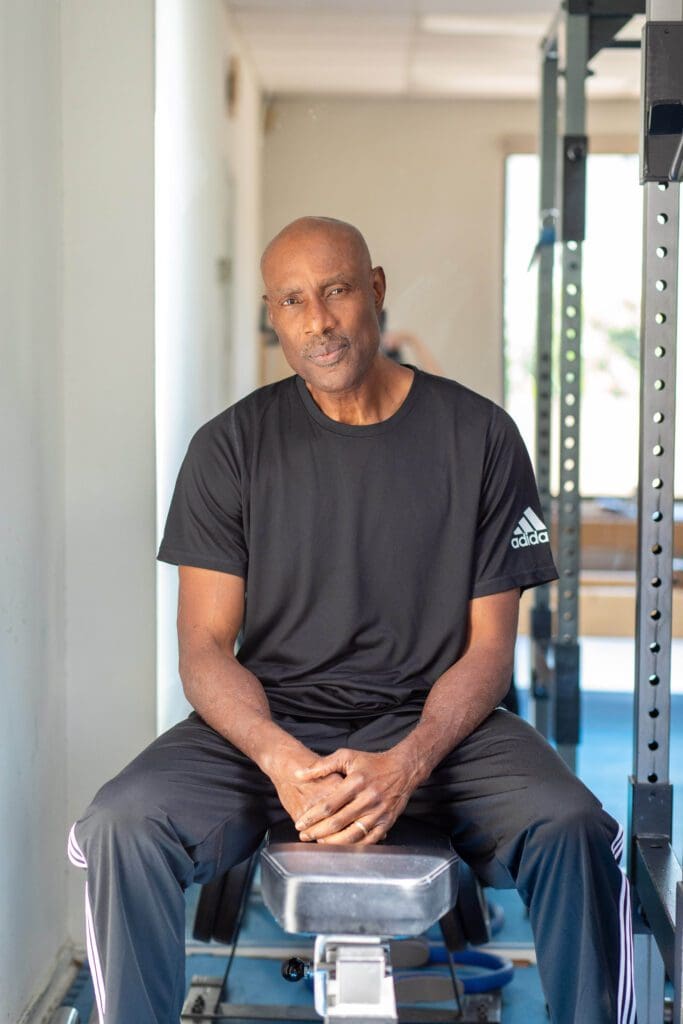
Victor Wilson (photo by Stephanie Kleinman)
As a personal trainer and master’s student at the USC Leonard Davis School of Gerontology, Victor Wilson focuses on aging and fitness. He says it’s critical to exercise as you age, because you lose 40% of your strength between the ages of 50 and 80.
In his studio, most of Wilson’s clients are over age 50; his oldest client ever was 95. “We have the same struggles and challenges with getting older,” says Wilson, who is 61. “You can talk about a lot of things with older adults, because they’ve had more life experience.”
Wilson believes the medical profession can do more to help people age in good health: “They are more focused on curing diseases or treating problems than on prevention. In Western medicine, the concept of mind-body wellness is missing.”
With an undergraduate degree in psychology and a master’s in kinesiology, Wilson felt his background could help fill the gap. First, he wanted to learn more about aging and to find a way to be of better service to his older clients. Gerontology seemed like a natural next step. And USC was where he wanted to be.
Mental and physical aging
The programs at the USC Leonard Davis School involve all aspects of aging. Professors introduce students to the biological, psychological, sociological, political, medical and business aspects of the lifespan.
In his second semester of the Master of Arts in Gerontology program, Wilson found what he was looking for. He says, “I wanted to get a handle on how the body changes, both mentally and physically, as we age. I want to be able to prepare my clients for what’s coming.”
A class that has been especially eye-opening for him is “Mind and Body Connection Through the Lifespan.” Wilson says that the class, which is taught by Assistant Professor Paul Nash and part-time lecturer Timothy Lu, focuses on the physical and mental effects of chronic stress.
“Chronic stress can lead to inflammation, which affects every system in your body. It can lead to depression, anxiety, autoimmune diseases, diabetes and osteoporosis,” Wilson says. “I have clients who have these conditions, but I didn’t know stress intensified them.”
Disparities in aging
Aging is universal, but not all people experience this process the same way. Like many students at the USC Leonard Davis School, Wilson feels a deep concern about the disparities among older adults.
“Most people can’t afford a personal trainer like me. I’ve always wanted to bring fitness training, especially tai chi, to older adults in low-income communities,” he says. Tai chi is a moving meditation that reduces stress and anxiety and improves strength and balance. It’s an especially good exercise practice for preventing falls in older adults.
Wilson says, “My goal is to train tai chi instructors so they can go to the community and help people.”
Wilson also sees a need among caregivers, who are more likely to experience physical, emotional and financial stress. Currently, he has an 84-year-old client whose caregiver and sister are often with her when Wilson visits for training sessions. He includes all three of them during the tai chi portion of the workout, viewing this as a model for expanding the reach of his services and the benefits that tai chi provides.
Putting gerontology into practice
The USC Leonard Davis School positions students to solve real-world problems related to aging. For Wilson, that problem is seniors who don’t get enough physical activity, and he is putting what he’s learned in the classroom into practice.
“I recently did a policy memo on physical activity guidelines. In doing that, I learned that only one in five adults over 18 is meeting the fitness guidelines. From age 65 to age 74, this drops to 16%. From age 75 and up, only 10% are meeting the guidelines,” he says. “So I’ve been talking to my clients about this, encouraging them to get moving and get their cardio minutes in.”
In the future, Wilson says, he envisions expanding his business and consulting on disease prevention. The USC Leonard Davis School will give him the credentials he needs.
What Wilson isn’t thinking about is retiring. Having grown up in Trinidad and Tobago, he doesn’t understand the concept, and none of his seven siblings who still live there have retired. He says, “Especially in this field, I don’t see why I would. My work benefits me in every way.”

